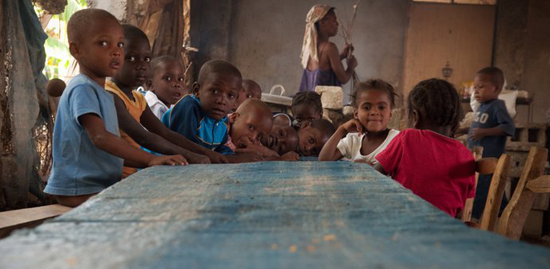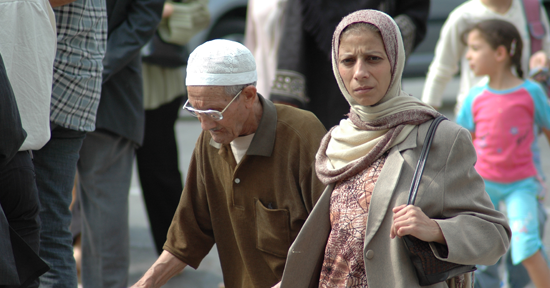
God still calls people to places where the ground is hard...
The Gospel in Hard Places
by Mark McPeak
The emotion was palpable as we watched the screen.
This young lady was an atheist, and now she has come to Christ. This orphanage has given us an open door to meet the needs of the children while sharing our faith with them.
The International Missions staff was spellbound, eyes full of tears. Tim and Lydia Awtrey had just returned from their first term in Bulgaria. Though practically drooping with fatigue, their passion and excitement was inspiring.
It felt as though we were in Jerusalem or Antioch 2,000 years ago, hearing from Paul about the fruits of his missionary excursions. The Awtreys shared story after story, picture after picture, and opportunity after opportunity. A phrase kept coming up as they shared with us. “We just need more help!” “If only we had someone to help,” cried Lydia, “there is so much good to be done!”
The Awtreys work in one of the hard places. Read more about the Awtreys...
Bulgaria, like many other nations with miniscule populations of evangelical Christians, is a tough place to plant a church. For many years, this small, poor nation was under the iron boot of Communism. Religious ideas were crushed as quickly as they were introduced. People were “programmed,” both in their thinking and by life oppression, to avoid anything religious as the answer to their problems.
“I will give you a new heart and put a new spirit within you; I will take the heart of stone out of your flesh and give you a heart of flesh.” Kristi Johnson, missionary to Spain, shared this verse from Ezekiel 36 as she spoke about her family’s calling to a pueblo called Alpedrete. The town’s motto is “Heart of Stone.” Alpedrete was one of 8,000 towns, villages, and pueblos in Spain without an evangelical church. It’s not anymore! The Johnsons, along with their ministry partners the Edgmons, work in one of the hard places. Read more about the Johnsons...
For many years, Free Will Baptists have believed we are called to send workers into the hard places. As we all work and pray for harvest, we deal with different stages of the process (as Paul described in 1 Corinthians 3:5-10). All of us would love to be where exciting harvest is occurring. Yet some people need to till the hard ground, or it may never experience harvest.

Photos: Children wait for food in an orphanage in Haiti (top). The streets of Algeria (above).
We are thankful God still calls people to places where the ground is hard. Laborers in these fields take their cue from the Apostle Paul: “And so I have made it my aim to preach the gospel, not where Christ was named, lest I should build on another man’s foundation, but as it is written: ‘To whom He was not announced, they shall see; And those who have not heard shall understand’” (Romans 15:20-21).
Limited Access to the Gospel
As Paul indicated, places exist where people can readily hear and consider the message of the gospel. And then, there are the hard places. These places are hard spiritually. People have little or no access to the saving message of the gospel.
Each lost person, regardless of location, has the same need: to hear and believe the message of Christ. Without Him, we are all hopeless. Many times, no one is there to tell them in the hard places. The Apostle Paul, after sharing the great news that anyone who calls on the Lord can be saved, asks, “How then shall they call on Him in whom they have not believed? And how shall they believe in Him of whom they have not heard?” (Romans 10:14).
In the hard places this question is especially critical. We all know the answer. With no access to the message of the gospel, men and women cannot call on Christ for salvation, simply because they have not heard. In this sense, the hard places are heartbreaking!
Free Will Baptist International Missions is a pioneer church-planting organization. When the board opens a new field of work, careful consideration is given to the question of access. “When we enter a new country, we choose places without access to the gospel,” says board chairman Danny Williams. “Although this involves pre-evangelism—since some people groups know nothing at all about God, the Bible, or the Atonement—it is worth it.”
Missionaries Face Great Difficulties
Free Will Baptists recently celebrated with national churches in countries like Cuba, India, Brazil, and Coté d’Ivoire. In each of these places, early pioneers carved out work in hard places. Now, the harvest is maturing, and we are working alongside our national brothers and sisters to facilitate exponential growth in souls saved, lives changed, and churches planted. Decades of backbreaking labor are paying off!
In some cases, missionaries spent their whole ministry seeing few people come to Christ. Still, they persevered, breaking up hard ground, painstakingly planting and watering, and making way for the potential harvest. So much investment with so little fruit can be extremely discouraging. Imagine being one of the only Christians in an enormous area, opposed by dark spiritual forces, attempting to overcome ignorance and false ideas. This is the life of the laborer in the hard places.
The work can be overwhelming. As the first converts come to Christ, the joy is tempered by fatigue as the work of discipling spiritual infants is added to the burden of evangelistic need. Consider wearing the hats of evangelist, pastor, mentor, and, in many cases, administrator, worship leader, youth director, counselor, conflict manager, and so on. You need a big hat rack! Even when missionaries go as teams, the challenges of alternating stateside assignments and basic life issues often leave them overwhelmed and exhausted.
Will You Help in the Hard Places?
As we pray for and invest in continued harvest, we must not lose our focus and passion for the hard places, and we need partners in this effort. Will you help us?
1. Adopt a missionary or team of missionaries working in one of these hard places. Tim and Lydia Awtrey shared their great appreciation for Darren Walker and the people of First FWB Church in Washington, North Carolina. “They have become passionate partners with us,” said Tim. “They know what’s going on in our lives and the church, and they do whatever they can to encourage and help us.” You can do this by visiting www.fwbgo.com.
2. Commit to your adopted “hard place.” Build a relationship with the missionaries who work there. Follow their posts online and correspond with them. As you get to know the place they are working and the people they want to reach, you will become a prayer warrior, joining in the spiritual battle. We believe God will begin to do some amazing things in the partnership. This may lead, in some cases, to opportunities to go and minister beside the missionary and national.
3. Join the Help in the Hard Places partnership. Your financial commitment will help missionaries go beyond breaking up the hard ground to harvest. See www.fwbgo.com for more information.
May God raise up many who will be part of the solution to the Apostle Paul’s question, “How then shall they call on Him in whom they have not believed? And how shall they believe in Him of whom they have not heard?” He answers in question form, “And how shall they hear without a preacher? And how shall they preach unless they are sent?”
Will you send help to the “hard places”?
About the Writer: Mark McPeak joined the Mission in April 2005, serving first as director of communications and then as deputy director of stateside operations. Although Mark joined a communications firm in middle Tennessee in February, his heart remains firmly attached to the International Missions community and purpose.
|

